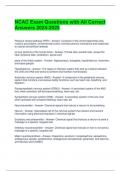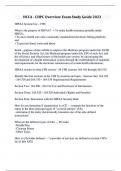NCAC Exam Questions with All Correct
Answers 2024-2025
Pleasure reward pathway (PRP) - Answer- Comprise of the ventral tegmental area,
nucleus accumbens, and prefrontal cortex; controls persons motivations and responses
to natural and artificial rewards
six key sections of the human brain - Answer- Frontal lube, parietal lobe, accept the
lube, temporal lobe, cerebellum, spinal cord
parts of the limbic system - Answer- hippocampus, amygdala, hypothalamus, neocortex,
and basal ganglia
Hypothalamus - Answer- The region of Olympic system that acts as a liaison between
the CNS and ANS and works to achieve and maintain homeostasis
Automatic nervous system (ANS) - Answer- A component of the peripheral nervous
system that monitors unconscious bodily functions, such as heart rate, breathing, and
digestion
Parasympathetic nervous system (PSNS) - Answer- A secondary system of the ANS
that, when activated, will decrease breathing, heart rate, etc
Sympathetic nervous system (SNS) - Answer- A secondary system of the ans, that
when activated will increase breathing, heart rate, etc
Neurotransmitter - Answer- Chemical signals that instruct a neuron to do something
Neuron - Answer- Specialised cell of the nervous system that receive and transmit
information using electrical impulses in chemical signals
Excitatory neurotransmitter - Answer- Chemical signal that instructs a neuron to send a
message to a specific, targeted cell
Inhibitory neurotransmitter - Answer- Chemical signal that instructs in Iran to not send a
message to a specific, targeted cell
Major neurotransmitters - Answer- Dopamine, serotonin, norepinephrine, epinephrine,
endogenous opioids, acetylcholine, endogenous cannabinoids, glutamate, and Gamma-
aminobutyric acid (GABA)
, Dopemine - Answer- Pleasure and reward movement, attention, memory
Drugs: cocaine, methamphetamine, amphetamine, alcohol, opioids
Serotonin - Answer- Mood, sleep, sexual desire, appetite
Drugs: MDMA, LSD, cocaine
Norepinephrine - Answer- Sensory processing, movement, sleep, mood, memory,
anxiety
Drugs: cocaine, methamphetamine, amphetamine, MDMA
Epinephrine - Answer- Stress response; flight or flight response; medication
Drugs: nicotine, stimulants, hallucinogens, MDMA
endogenous opioids - Answer- Analgesia, sedation, rate of bodily functions, mood
Drugs: heroin, morphine, prescription painkillers
Acetylcholine - Answer- Memory, arousal, attention, mood
Drugs: nicotine, caffeine, hallucinogens
endogenous cannabinoids - Answer- Movement, cognition, and memory
Drugs: marijuana
Glutamate - Answer- Excitatory: neuronal activity increased, learning, cognition,
memory
Drugs: ketamine, phencyclidine, alcohol
Gamma-amniobutyric acid (GABA) - Answer- Inhibitory: neuronal activity slowed,
anxiety, memory, Anastasia
Drugs: sedatives-hypnotics, tranquilizers, alcohol
Agonist - Answer- A type of psychoactive substance that finds to a neuron and elicits a
reaction as if it was a neurotransmitter Example: methadone
Antagonist - Answer- A type of psychoactive substance that binds to a neuron and
prevent other neurotransmitters from binding to that neuron
example: naltrexone
Partial agonist-antagonist - Answer- Will partially activate the receptor site and partially
block the receptor site example: buprenorphine
Reuptake - Answer- The process by which mirror transmitters, who have activated their
receptors, are taking back into the original neuron
short-term physiological effects of CNS depressants - Answer- impaired coordination,
slurred speech, staggering gait, drowsiness, muscle relaxation, slowing of breath -
decreased respiration, slowing of heart rate, dizziness, sedation





